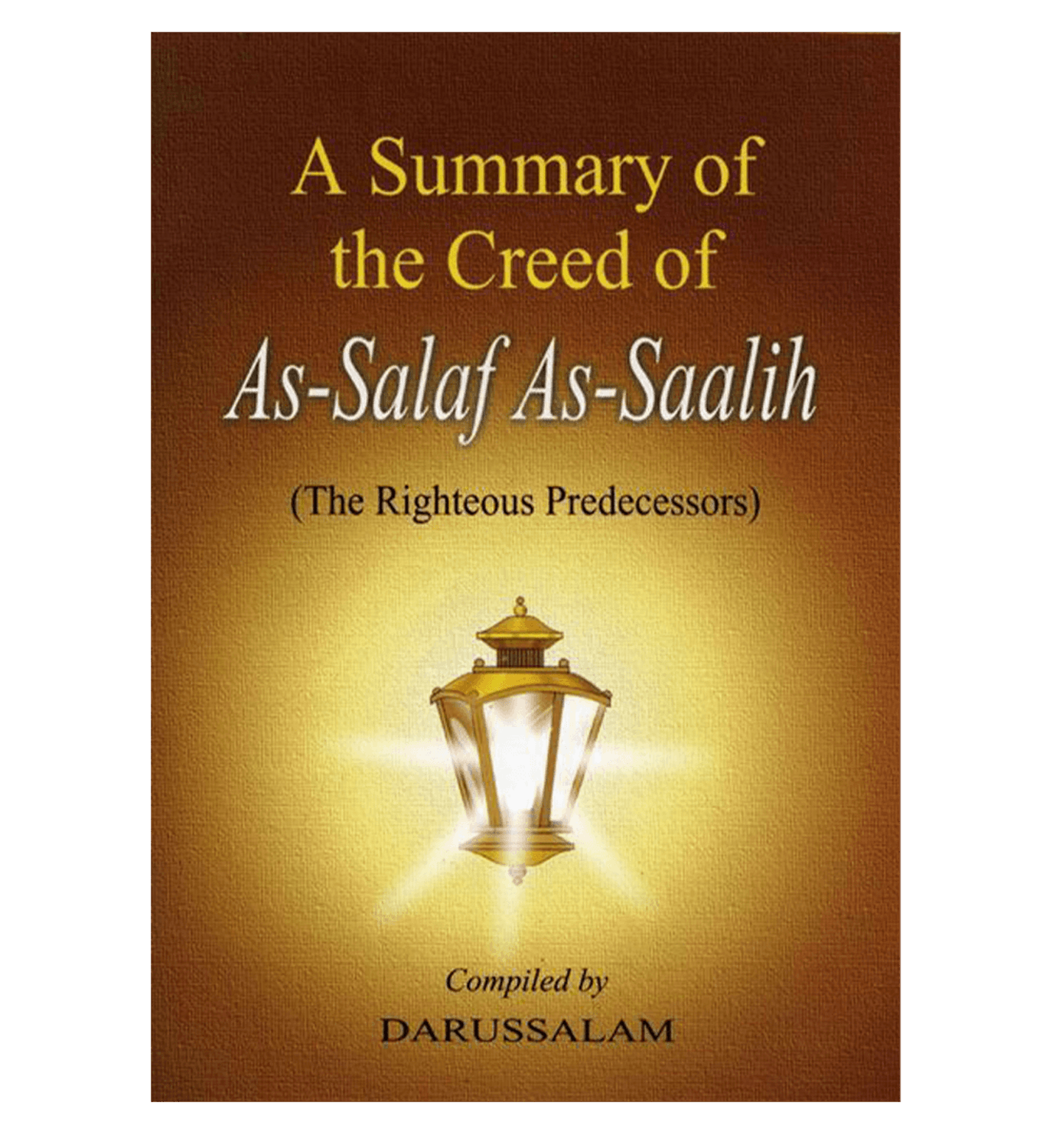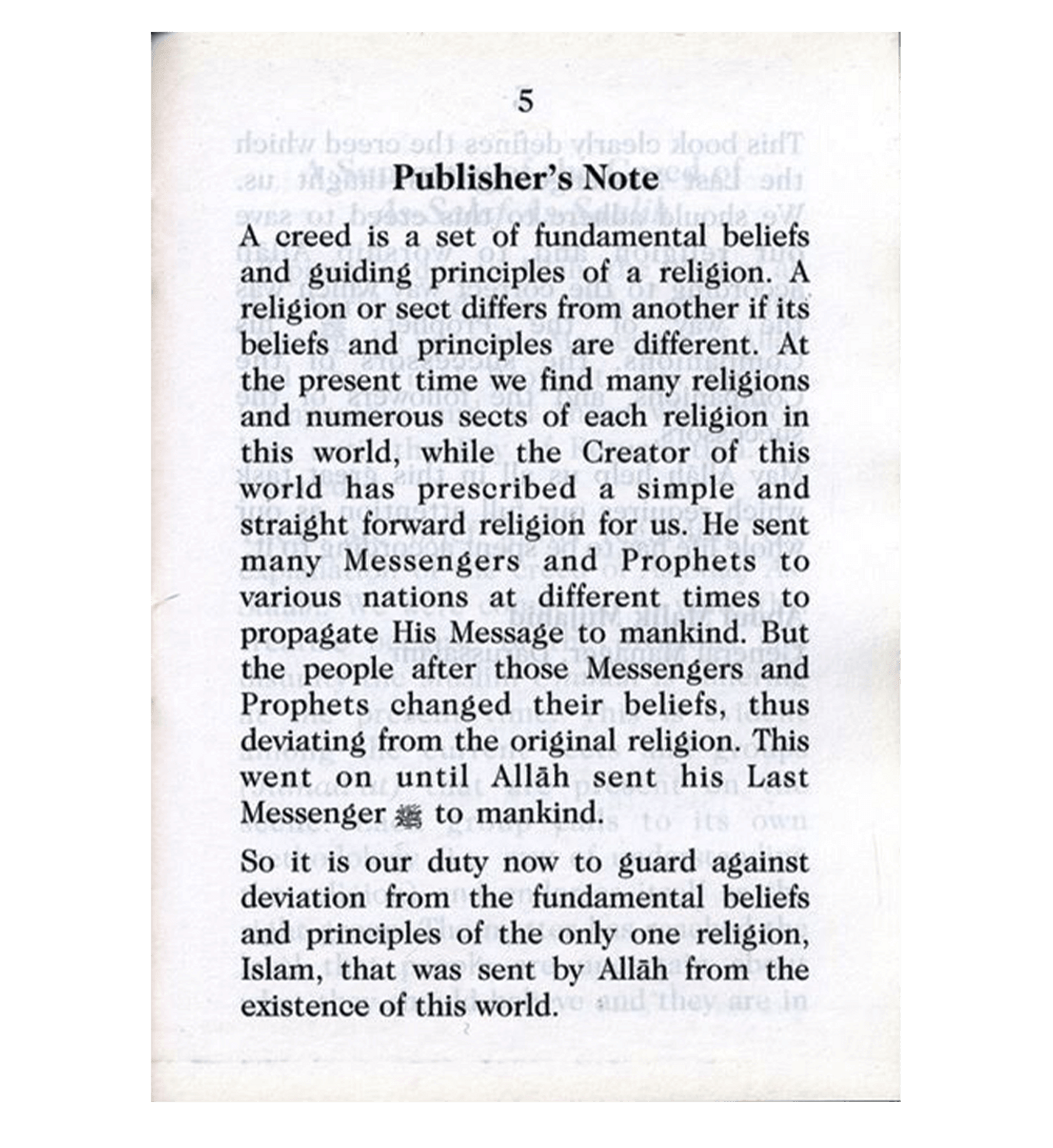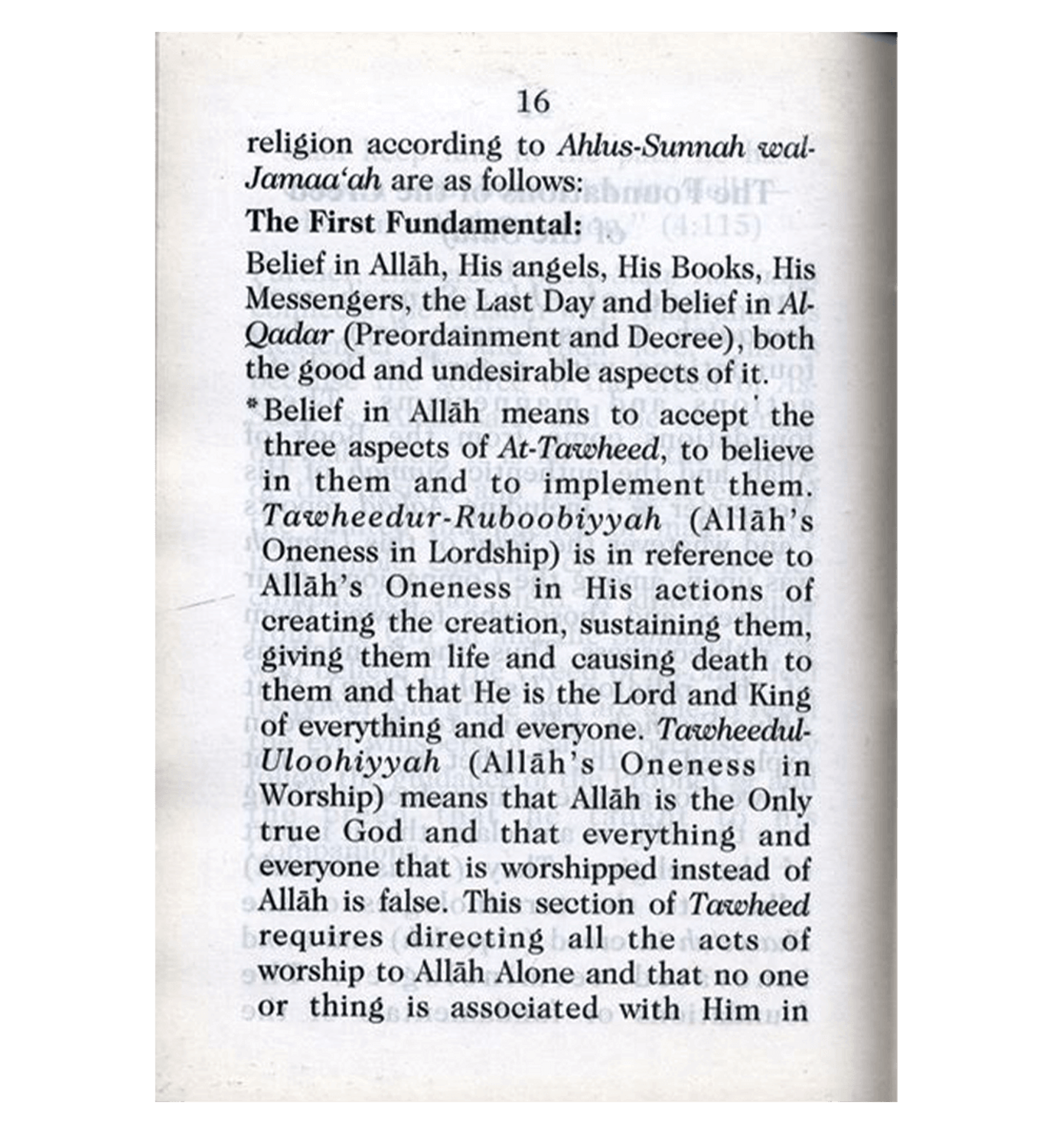A Summary of the Creed of As-Salaf As-Saalih | Abdul Malik Mujahid
A Summary of the Creed of As-Salaf As-Saalih | Abdul Malik Mujahid
Publisher:
Darussalam
Language:
English
Binding:
Soft Cover
Pages: 40
Size: 12x17cm
Couldn't load pickup availability



Collapsible content
Description of Book
A Summary of the Creed of As-Salaf As-Saalih | Abdul Malik Mujahid
The Creed of As-Salaf As-Saalih, or the Creed of the Righteous Predecessors, refers to the fundamental beliefs and practices upheld by the early generations of Muslims, specifically the companions of Prophet Muhammad (peace be upon him), their followers (Tabi‘un), and the followers of the followers (Atba‘ al-Tabi‘in). These three generations are regarded as the most authentic and exemplary models of Islamic faith and practice. The core principles of the creed emphasize a strict adherence to the teachings of the Qur’an and the Sunnah (traditions of the Prophet), and it rejects innovations (bid‘ah) and deviations in religious practice.
Detailed Summary of the Creed of As-Salaf As-Saalih:
1. Tawhid (Monotheism):
The foundation of the creed is Tawhid, the absolute oneness of Allah. This principle asserts that Allah is the sole creator, sustainer, and ruler of the universe, with no partners or associates. Belief in Tawhid encompasses the understanding that Allah alone deserves worship, and every aspect of a Muslim’s life should be directed towards pleasing Allah.
2. Acceptance of the Qur’an and Sunnah:
The Qur’an is the literal word of Allah, revealed to Prophet Muhammad, and it is the primary source of guidance for all Muslims. The Sunnah, which includes the actions, sayings, and approvals of Prophet Muhammad, is also an essential source of guidance. The Salaf adhered to both the Qur'an and the Sunnah, considering them to be inseparable and the final sources of law and morality. They believed that any interpretation or practice that deviated from these sources was an innovation.
3. Iman (Faith):
In the Salafi creed, Iman is both belief and action. It includes:
- Belief in the six pillars of faith: belief in Allah, His angels, His books, His messengers, the Last Day, and the decree of Allah (Qadr).
- Iman increases with obedience to Allah and decreases with sin. It is a dynamic aspect of a believer’s life, not a static one.
4. Following the Example of the Companions (Sahabah):
The companions of Prophet Muhammad (Sahabah) are considered the best generation of Muslims. The Salafists emphasize following their practices, attitudes, and understanding of Islam. This includes a literal adherence to the principles laid out by the Prophet and his companions without any additions or omissions.
5. Rejection of Bid‘ah (Innovation):
A central tenet of the creed is the rejection of Bid‘ah (innovation) in religious matters. The Salaf believed that all religious practices must be rooted in the Qur'an and Sunnah. Any new practices or beliefs introduced after the Prophet's death were seen as innovations that could potentially lead the community away from the true path. This includes innovations in worship, creed, and other religious matters.
6. The Importance of Following Scholars of the Early Generations:
The early generations of Muslims (Sahabah, Tabi‘un, and Atba‘ al-Tabi‘in) are considered the best models of Islamic scholarship and practice. The Salaf emphasized that one should refer to the understanding of the Qur'an and Sunnah as interpreted by these early scholars, as they were the closest in time and understanding to the Prophet's teachings.
7. Ahl al-Sunnah wa-l-Jama‘ah:
The Salaf adhere to the creed of Ahl al-Sunnah wa-l-Jama‘ah, which refers to the people of the Sunnah and the community. This refers to those who follow the authentic teachings of Islam as transmitted by the Prophet and his companions. They reject sectarianism and innovation, aiming for unity based on the true teachings of Islam.
8. Respecting the Scholars and the Community:
Salafi beliefs emphasize respect for the scholars who are knowledgeable in the Qur'an, Sunnah, and Islamic law. They believe that the scholars have the responsibility to guide the community and to preserve the purity of the faith. Moreover, they emphasize unity within the Muslim community, but only around the authentic practices of Islam.
9. Avoiding Extremes:
The Salafists seek a balanced approach in worship, character, and interaction with the world. They avoid extremes in matters of faith and practice, which can lead to either excessive leniency or strictness that was not present in the time of the Prophet and his companions.
10. Judging by the Qur'an and Sunnah:
The Salafi creed asserts that all matters, both religious and worldly, should be judged according to the Qur'an and Sunnah. This includes issues of governance, social justice, law, and personal conduct. The Salafi movement stresses that no individual, group, or society has the right to legislate or innovate in religious matters without direct evidence from these two sources.
11. Opposition to Sectarianism:
The Salafis oppose division within the Muslim ummah (community) into various sects or groups. They hold that the true path of Islam is the one followed by the Prophet and his companions, and any sectarianism or splitting into different factions is seen as contrary to the unity intended by Allah.
12. The Role of Fiqh (Jurisprudence):
While the Salaf emphasize strict adherence to the Qur'an and Sunnah, they also respect traditional Islamic jurisprudence (fiqh) as long as it is rooted in the sources. Salafis typically prefer following the four main Sunni schools of thought (Hanafi, Maliki, Shafi'i, and Hanbali) but they emphasize staying within the boundaries of the foundational texts.
Publisher
Darussalam
Author
Sample Pages - Content
Page : 01
A Summary of the Creed of
As-Salaf As-Saalih
(The Righteous Predecessors)
Compiled by DARUSSALAM
Page : 02
5
Hoid bosno odi asnitob vhsolo lood airT au Publisher's Note fo
9782 01 bs
A creed is a set of fundamental beliefs and guiding principles of a religion. A religion or sect differs from another if its beliefs and principles are different. At the present time we find many religions and numerous sects of each religion in this world, while the Creator of this world has prescribed a simple and straight forward religion for us. He sent many Messengers and Prophets to various nations at different times to propagate His Message to mankind. But the people after those Messengers and Prophets changed their beliefs, thus deviating from the original religion. This went on until Allah sent his Last Messenger to mankind.
to
So it is our duty now to guard against deviation from the fundamental beliefs and principles of the only one religion, Islam, that was sent by Allah from the existence of this world, and they are in
Page : 03
16
religion according to Ahlus-Sunnah wal- Jamaa'ah are as follows: booHT The First Fundamental:" (4:115) Belief in Allah, His angels, His Books, His Messengers, the Last Day and belief in Al- Qadar (Preordainment and Decree), both the good and undesirable aspects of it. *Belief in Allah means to accept the three aspects of At-Tawheed, to believe in them and to implement them. Tawheedur-Ruboobiyyah (Allah's Oneness in Lordship) is in reference to Allah's Oneness in His actions of creating the creation, sustaining them, giving them life and causing death to them and that He is the Lord and King of everything and everyone. Tawheedul- Uloohiyyah (Allah's Oneness in Worship) means that Allah is the Only true God and that everything and everyone that is worshipped instead of Allah is false. This section of Tawheed requires directing ball the acts of worship to Allah Alone and that no one or thing is associated with Him in
Who is Abdul Malik Mujahid?
An established author and publisher, Abdul Malik Mujahid is the founder of Dar-us-Salam Publications. He focuses on providing authentic Islamic resources worldwide, covering diverse topics in Islamic learning and lifestyle.



